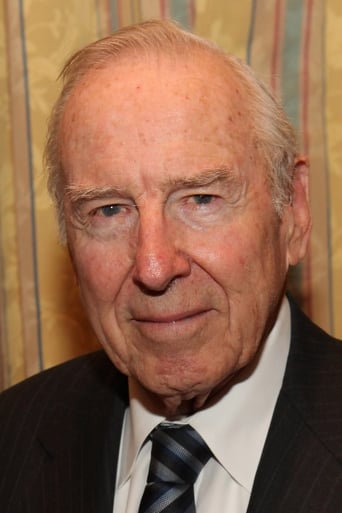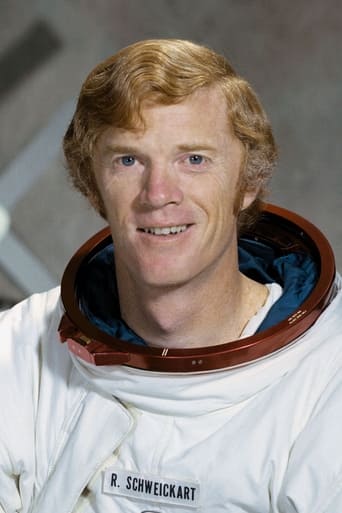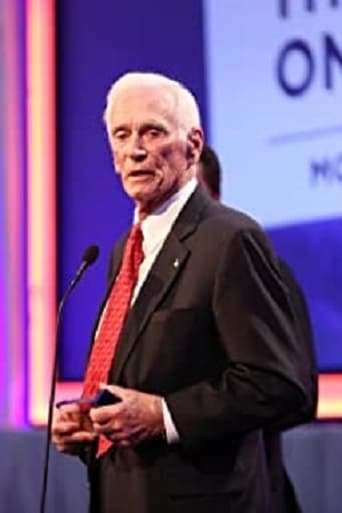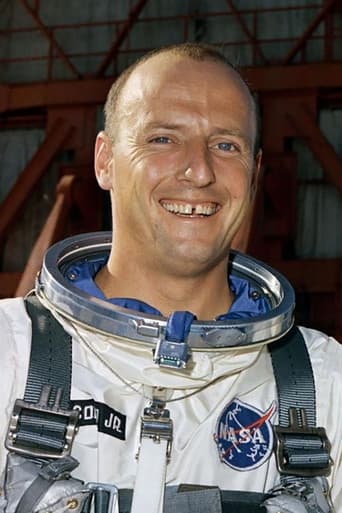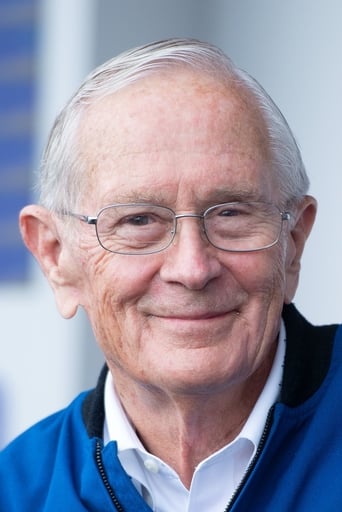Fluentiama
Perfect cast and a good story
MoPoshy
Absolutely brilliant
Stoutor
It's not great by any means, but it's a pretty good movie that didn't leave me filled with regret for investing time in it.
Phillipa
Strong acting helps the film overcome an uncertain premise and create characters that hold our attention absolutely.
rawkmonster
Unlike David Sington with 'In The Shadow Of The Moon' 18 years later, 'For All Mankind' director Al Reinert doesn't address conspiracy theories about faking the moon landings. He doesn't need to, he's just sat through 6 million feet of film from the Apollo and Gemini missions. He has watched President Kennedy's speech about putting a man on the moon in which he makes clear that the technology for doing this has not even been invented yet. He has seen the tragic deaths of the crew of Apollo 1 in a roaring fireball in a test before they even got off the ground. He has seen footage of touchdowns and take-offs from the lunar surface. He has heard hours of detailed communications between astronauts and the ground crews. There is no need to waste screen time in addressing idiots. It reminds me of seeing a protest against Scientology in Edinburgh; to me, Scientology is so ridiculous that to protest against it gives it a weight that it doesn't deserve. Interestingly, Reinert also doesn't waste screen time on most of the things that 'In The Shadow Of The Moon' would take up; the cold war, the fighter pilot backgrounds of the Apollo crews. That film takes a more conventional all-around documentary approach, with close-up talking heads whose names and missions are restated on-screen each and every time they speak. With this film there is none of that, in fact it's often difficult to decipher who is speaking and which particular mission footage is from, or even if the voice and the footage are from the same flight.The different missions are instead merged together in a single sequence, beginning on the launch pad, all the way into orbit, lunar landings, reconnaissance on the surface, take-off and return. Each mission was essentially the same as any other from Apollo 11 onwards, with the exception of Apollo 13 which blew an oxygen leak and had to be abandoned. The drama of that situation is massively underplayed here, there are none of the great sweeping strings moments, we have only highly professional men doing highly specialised jobs... at least until we get out of earth's gravitational field.What follows from this point is the strength of 'For All Mankind'. Everyone has heard about the cold war, beating the Russians, the whole world watching on TV as Neil Armstrong comes down the ladder. Our sense of wonder was in looking at them, their sense of wonder was in looking at what they could see and experience directly. As soon as the gravity departs, these ultimate professionals become children again, spinning torches in zero gravity, bouncing around on the moon singing "tum ti tum ti tum..", playing country music on tape recorders, listening out for college football scores. We even see astronauts messing around so much that they go sprawling on the ground, only to end up scolding each other for getting so dirty.Not telling us exactly what is going on, or who is speaking, or exactly what you are watching can be frustrating, but it allows us a view of events free from the context of politics, nostalgia, even personality at times. Dave Scott of Apollo 15 stands looking upon the Moon's hilly terrain and observes "I realise there's a fundamental truth to our nature... Man must explore". Absinthe minds will enjoy the sense of wonder that comes from seeing people on the surface of another world, far increased over most film representations by being real footage with real people.Even so, there is a little directorial dishonesty, or artistic license depending on how you want to look at it. Scenes from Gemini are inserted to appear like those from Apollo. Kennedy's opening speech has a word dubbed, altered from "for the progress of all people" to "for the progress of all mankind", in order to better suit the purposes of the film. Understandable, perhaps, but why fiddle it? Similarly a memorable audio clip describing how the Moon was perfectly lined up ahead of the space shuttle as it stood on the launch pad is accompanied by a clip showing this. The only problem is that this footage did not exist - it was created for the film by pasting a photo of the Moon over the command module, now in a museum. Again, understandable, and seeing the Moon through that window alongside the description is indeed memorable. but when you find out that it was created and inserted it's a bit of a let down, like finding out that the Ramones legendary live album 'It's Alive' was largely re-recorded in a studio afterwards.What isn't at all a let-down is the Brian Eno soundtrack, whose eerie ethereality keeps you in mind of the dimensions of space as compared to the delicate tin can of the lunar lander modules. The fragility of these vehicles is best summed up by the little windows, which look almost impossibly delicate given that one small breach would mean near-instant death for all on board. Amidst the euphoria and clowning, Eno retains and carries our sense of delicacy and amazement.
crash21
I typically enjoy documentaries about the original moon missions, but I was quite disappointed when I watched "For All Mankind." I have to ask, "where is the documentary aspect?" Most of this film was nothing but slow, boring video shot by the original astronauts with annoying music playing in the background. They don't explain anything, the closest they come to narrating any of this is every five minutes or so, someone makes a short 15 second comment, but that's basically it.I think the History Channel did a much better job with their documentary "Failure Is Not An Option", it was 100 times better than this, simply because they combined the video from the moon missions with good narration and interviews with the original astronauts and mission control staff.In my opinion, "For All Mankind" was nothing more than a collection of the moon astronaut's home videos and it has the quality of a homemade film.
Matthew Kresal
I saw this film at a very, very young age and I suspect that it is the reason I developed a heavy interest in space exploration. I recently saw this again for the first time in many years since all I had was a vague recollection of it. And after watching many times since then I have no problem saying that this is one of the best documentaries ever made.One must give the film's director, Al Reinert, at a ton of credit for his work. Who else could have come up with the brilliant notion behind this film? Who would have thought of taking footage from all of the Apollo missions (and a couple of the Gemini missions) and combining them with the words of the men who went where no one had (or has since) gone before? (Apologies for paraphrasing Star Trek) The genius of this film is that it shuns away from traditional documentary styling. Instead of compiling facts on one mission and having a well known actor/actress do the narration, the film lets those who went tell the story. Who else is better qualified? They might not be professional actors, but the astronauts don't need to be. It is the power of the events they describe that is the main reason for their presence. They are a powerful voice in this story.In many reviews I have read, I have seen complaints about the mixing of footage or the use of footage out of its context (a Gemini reentry used for the TLI burn for example). Yes the mixing is nowhere near subtle and is, thus, blatantly obvious. But it is my feeling that this mixing was necessary. The only way to get across the story of Apollo's achievement to the average person was to mix the footage. Does it really matter in the end? I mean by that this: the film isn't about a single mission to the Moon. No, the power of Apollo lies not in each mission, but in the overall effect of the Apollo program. This film is about the journey of Apollo, the effect in had on the astronauts, and the effect it had on us all.If there is one element of this film that really stayed with men it was the music. It is among the most beautiful and haunting things you will ever here. Brian Eno does a marvelous job of conveying the mystery and majesty of both space and the Moon. This is one of those scores who really have to hear to believe.For All Mankind, perhaps better then anything else out there, demonstrates the power of humanity in space. For one to really appreciate this film it needs to be seen on a large screen in surround sound. Only then can one appreciate both the film and the power of the Apollo legacy. This is the first film I've seen that I recommend to everyone. This is a film that is truly "For All Mankind".
Scott W. Larson
I won't reiterate all of the praise of this film except to say that if I had just few more spare dollars when it was released on laserdisc, I would have bought a laserdisc player just for this title (and 2001). Fortunately years later I've already purchased a DVD player and For All Mankind has finally been released on that format.To me the defining moment of this film is the lunar lander slowly returning to the command module. At first we only see the cratered surface of the Moon moving below at incredible speed. Then we see a tiny motionless speck above it. Was it a defect in the lens? Of course not. It's the lunar lander slowly returning from the surface. It seems to take much longer than it really does because there are no cuts and no narrator explaining what we already know we're seeing. There's only a dot turning into a space ship. What more could you add to this amazing sight?
